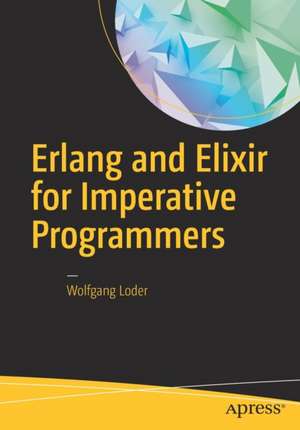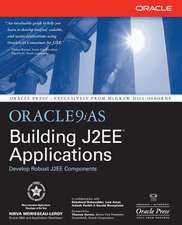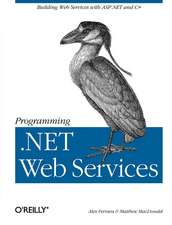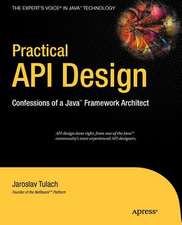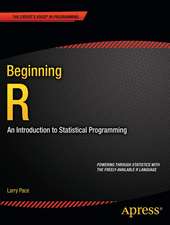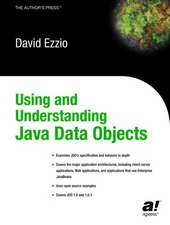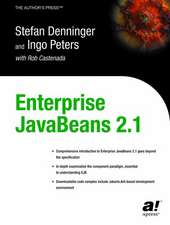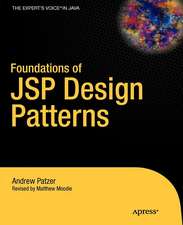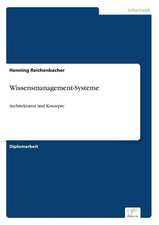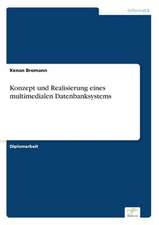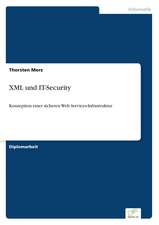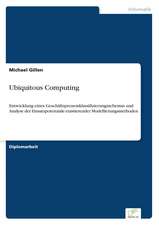Erlang and Elixir for Imperative Programmers
Autor Wolfgang Loderen Limba Engleză Paperback – 30 noi 2016
Learn and understand Erlang and Elixir and develop a working knowledge of the concepts of functional programming that underpin them. This book takes the author’s experience of taking on a project that required functional programming and real-time systems, breaks it down, and organizes it. You will get the necessary knowledge about differences to the languages you know, where to start, and where to go next.
Have you been told by your customer or manager that they heard good things about Erlang, you should use it for the next project? Never had to deal with functional programming or real-time systems? In 2014, the author, Wolfgang Loder, developed a repository for digital assets that had to deliver those assets in binary form quickly and reliably, being able to deal with at least hundreds of requests per second.
Since he could decide the architecture and software stack of the solution, he immediately thought of Erlang and its libraries and started to evaluate this option. It was not long after that he discovered Elixir, which sits on top of the Erlang virtual machine and has features more palatable for non-functional programmers, although it is a functional programming language itself.Erlang and Elixir for Imperative Programmers gives you a basis for deciding whether the effort is viable for your next project. This book is partly a tale of the author's own experience and partly a description of the bigger and more subtle differences between Erlang/Elixir and languages such as C++, Java, and C#.
Have you been told by your customer or manager that they heard good things about Erlang, you should use it for the next project? Never had to deal with functional programming or real-time systems? In 2014, the author, Wolfgang Loder, developed a repository for digital assets that had to deliver those assets in binary form quickly and reliably, being able to deal with at least hundreds of requests per second.
Since he could decide the architecture and software stack of the solution, he immediately thought of Erlang and its libraries and started to evaluate this option. It was not long after that he discovered Elixir, which sits on top of the Erlang virtual machine and has features more palatable for non-functional programmers, although it is a functional programming language itself.Erlang and Elixir for Imperative Programmers gives you a basis for deciding whether the effort is viable for your next project. This book is partly a tale of the author's own experience and partly a description of the bigger and more subtle differences between Erlang/Elixir and languages such as C++, Java, and C#.
What You'll Learn
- Discover functional programming, Erlang, and Elixir
- Work on service design and service features
- Set up your environment: deployment, development, and production
- Implement the service including public interface, asset processing, and deployment
- Use the patterns and concepts found in Erlang including type creation concepts and code structuring.
Who This Book Is For
Experienced and savvy programmers, coders, and developers new to Erlang and Elixir.
Preț: 245.12 lei
Preț vechi: 306.40 lei
-20% Nou
Puncte Express: 368
Preț estimativ în valută:
46.91€ • 48.79$ • 38.73£
46.91€ • 48.79$ • 38.73£
Carte tipărită la comandă
Livrare economică 14-28 aprilie
Preluare comenzi: 021 569.72.76
Specificații
ISBN-13: 9781484223932
ISBN-10: 1484223934
Pagini: 259
Ilustrații: XVIII, 256 p. 76 illus., 43 illus. in color.
Dimensiuni: 178 x 254 x 15 mm
Greutate: 0.48 kg
Ediția:1st ed.
Editura: Apress
Colecția Apress
Locul publicării:Berkeley, CA, United States
ISBN-10: 1484223934
Pagini: 259
Ilustrații: XVIII, 256 p. 76 illus., 43 illus. in color.
Dimensiuni: 178 x 254 x 15 mm
Greutate: 0.48 kg
Ediția:1st ed.
Editura: Apress
Colecția Apress
Locul publicării:Berkeley, CA, United States
Cuprins
Part 1: Before we start.- Chapter 1: Imperative vs. Functional Programming.- Chapter 2: From Erlang to Elixir.- Chapter 3: Setting your Mind.- Chapter 4: Service Overview and Design.- Chapter 5: Service Features.- Chapter 6: Environment and Deployment.- Chapter 7: Development Setup.- Chapter 8: Production Setup.- Chapter 9: Overview.- Chapter 10: Public Interface.- Chapter 11: Asset Processing.- Chapter 12: Deployment.- Chapter 13: Overview Patterns and Concepts.- Chapter 14: Functional Concepts.- Chapter 15: Type Creation Concepts.- Chapter 16: Code Structuring Concepts.- Appendix A: Modeling.- Appendix B: Resources.- Appendix C: Features-Framework-Concepts Matrix.- Appendix D: Quick Guide to Erlang and Elixir.
Notă biografică
Wolfgang Loder is programming software since the 1980s. He successfully rejected all calls for management roles and remained hands-on until now. His journey went from Assembler and C to C++ and Java to C# and F# and JavaScript, from Waterfall To Agile, from Imperative to Declarative and other paradigm changes too many to list and remember. Most of his career Wolfgang was a contracting 'Enterprise Developer', so the introduction of 'new' languages, frameworks and concepts is very slow in this field. Once he decided to develop his own products he was free of such constraints and ventured into all sorts of paradigms, be it NoSQL or functional and evaluating all the latest ideas, crazy or not. In other words, he has fun developing software. Wolfgang was born in Vienna, Austria and lives in the UK and Kenya.
Caracteristici
A unique, practical guide to learning and using Erlang based on author's personal case-driven experience Author is an expert programmer and has been practicing since the 1980s
